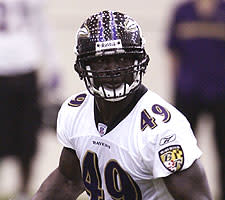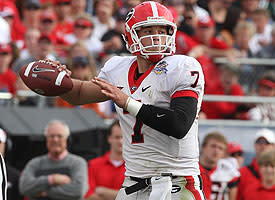Due diligence blurs line of ethical behavior
One year later,
remembers the empty rooms, the trips where he went to meet with NFL executives, but at some point in the process, ended up sitting alone with a team's psychologist.
They were the kinds of meetings where everything was on the table: his life, his relationships, how he felt about his parents, and telling questions about authority, money and women.

Gooden was a third-round pick in 2008.
(James Lang/US Presswire)
"I guess it was just to make sure you're all there," the former Miami Hurricanes linebacker said, recalling sessions with psychologists for the San Francisco 49ers and the team that eventually drafted him, the Baltimore Ravens. "I don't blame anybody for doing it."
In the wider scope of the NFL draft process, the league's nitpicking into a prospect's subconscious is hardly the most Orwellian tactic employed. Indeed, as guaranteed money continues to rocket upward and personal conduct remains a primary focus by commissioner Roger Goodell, the probing nature of the NFL has seemed to intensify – if not push the boundaries of ethical behavior.
Earlier this year, executives of three NFL teams admitted to Yahoo! Sports that they had used fake information to gain access to the personal pages of draft prospects on social networking sites such as Facebook and MySpace. Meanwhile, the use of psychologists gained more attention after former Georgia quarterback Matthew Stafford met with the 49ers and took exception to some prying questions about his parents' divorce.
All of this comes only two years after one of the most eye-opening allegations in draft history.
, the 2007 No. 1 overall pick of the Oakland Raiders, claimed he was tailed for at least two weeks by a man he believed was doing work for an NFL team. Russell said his uncle had gotten a tip that the former LSU quarterback had been followed for a sustained period of time, including from a trip from Baton Rouge, La., to his hometown of Mobile, Ala., and back again. At first, Russell said he had a hard time believing it, but then the source described places Russell had been and the frequency.
"What the guy said sure did happen that way," Russell said. "… I have to admit, it was a little strange, but it's OK."
But if that story is indeed true – and it has never been revealed which team might have employed that tactic – is it acceptable? Some, like former Green Bay Packers general manager Ron Wolf and Super Bowl winning coach Dick Vermeil, have a hard time believing it could get to the level of deception that is alleged to be taking place.
"I can't imagine they're [tailing draft picks]," Wolf said. "I think that's too far. I can't imagine a team tailing a guy."
Added Vermeil, "No question that's wrong. That goes beyond what I think it is ethical in the evaluation process."
But both admit that the current landscape of the NFL – flush with money and as pressurized and scrutinized as ever – is one where ethics are at the very least distorted by some teams. And no process has become more susceptible to that than the draft, where raw, uncorrupted intelligence on players is more valuable than ever.
When Wolf and Vermeil went through the vetting process in the 1980s, draft-related security services were at a minimum. Through that decade, the majority of the league's snooping was focused on gaming, a concern that actually caused then-commissioner Pete Rozelle to create the league's security office in the 1960s.
But all of that has drastically changed, particularly over the last decade, as teams and their security details have become more focused on other facets of off-field behavior. Every NFL team is now required to have a contracted security specialist – individuals who are most often in the upper reaches of law enforcement. Some have former FBI agents on the payroll. The Cleveland Browns employ Lewis C. Merletti, a onetime Special Forces soldier in Vietnam who moved on to become the director of the U.S. Secret Service and oversee the protection of five presidents.
Indeed, former Browns general manager Phil Savage said two things have led to the league's draft process delving deeper and sometimes pushing the boundaries of ethical behavior: specialization and money. From the larger perspective, NFL support and security staffs are larger than they have ever been, giving teams the ability to assign more minute tasks that likely would have overwhelmed scouts and personnel men 20 years ago. And with the money on the line – particularly at the top of the draft – some teams are likely willing to walk a fine ethical line, or potentially even cross it, to get difference-making information.
While Savage stressed that he believes he has always been with organizations that operated above board, he added "there's no question" that money has likely influenced some questionable tactics.
"As the money has gone up, the pressure has increased on everybody – not only the player, but the coaches, the GMs and everyone," he said. "The higher the money goes, the more infallible people think you should be. [People believe] you should never lose a game, you should never throw an interception, and you should never miss a draft pick. And that's just not going to happen."
But what constitutes right and wrong continues to be a debatable point. While the 49ers have gotten the most recent attention for having their team psychologist sit in on interviews, it's not exactly a ground-breaking move. Some NFL teams have employed a written psychological test for decades. The New York Giants have been one of the biggest proponents of it, often giving prospects exams that last up to two hours, asking potential picks what kind of animal they would like to be or what color car they would like to drive.
Actually having a psychologist sit down personally with a draft pick is merely a new twist on an old tool. And it's done largely to counteract the potential of written tests to be manipulated.
"I think after a while, people grew stale with [the written test]," Savage said. "The other thing: the players. I think some of them kind of messed around with it. They tried to out-guess the test, giving answers they believed would portray them in a more positive light."

Stafford could be the first player off the board Saturday.
(Matthew Emmons/US Presswire)
But the move toward a more aggressive approach – such as asking Stafford about his parents' divorce and then gauging his response – is something that causes pause amongst some former executives.
"I don't blame the kid [for getting upset]," said former Buffalo Bills coach and general manager Marv Levy. "If you're asking me, it's a step too far. I don't know if it's illegal or against the league rules or anything else, but from the point of view of overkill, yeah, I think that's it."
Beyond some hard guidelines within the draft process, such as the maximum 30 prospect visits allowed for each NFL team, the league doesn't have a specific set of rules governing a team's actions. Instead, scenarios could be punishable on a case-by-case basis under the umbrella of what's deemed detrimental to the NFL. But at no point has the league issued a decree saying potential draft picks couldn't be tailed, or that social networking pages couldn't be spied upon. Instead, the league has allowed teams to operate within their own ethical guidelines.
"I can't say that I'm surprised if that did happen," said Savage, referring back to the Russell situation. "You've got to realize there are 32 teams out there, and you're talking about $30-plus million in guaranteed money. I think it's a team's right, truthfully, to do whatever they feel is necessary to make it comfortable enough to hand somebody $30 [million] to $35 million."
As Wolf put it, "This is a little different animal right now. Today, if you're an administrator and you're not doing well, you've got two or three years and then that's it – it's all over. So you better make sure that what you're getting is not tarnished goods. So I wouldn't think there would be anything [in a prospect's life] that would be prohibited. You're about to make that guy rich, but it's your future at stake as well."

